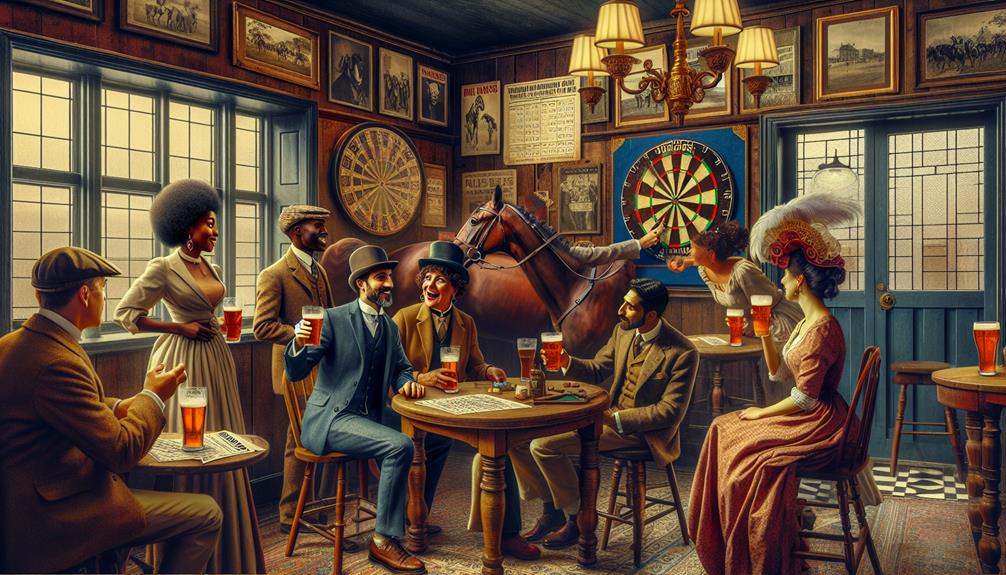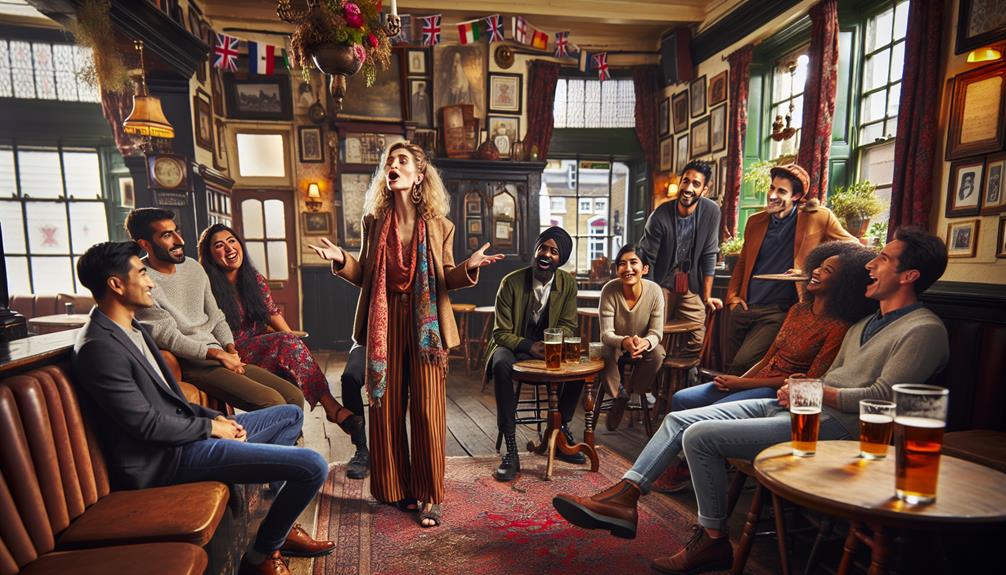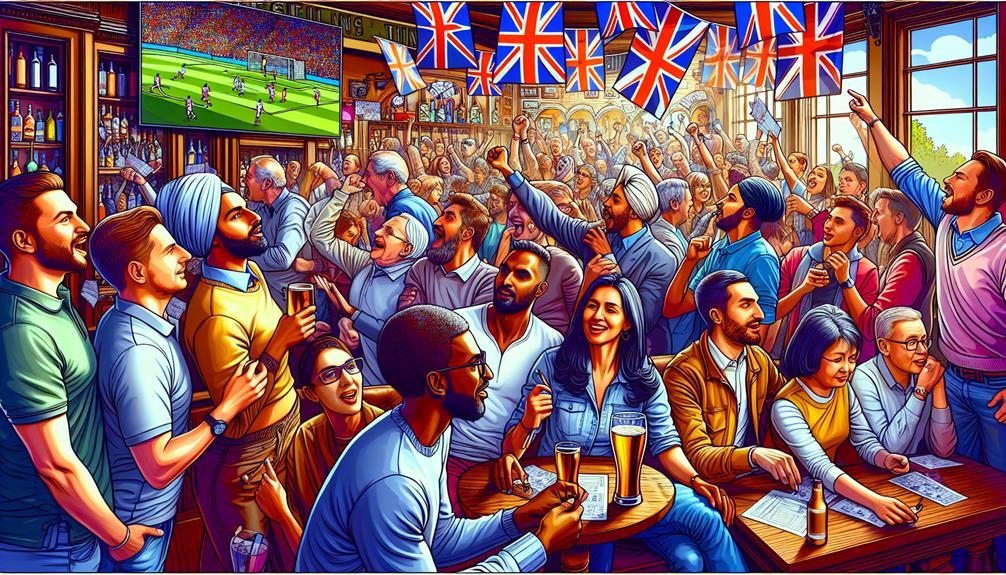Diving into the world of British slang, you're bound to bump into the term 'punter.' It's a word that wears many hats, depending on who you're talking to and where you are.
Originally associated with gambling and those who place bets, 'punter' has evolved to encompass customers or users in a variety of contexts. But there's more under the surface of this seemingly straightforward term. As you explore its origins and journey across the cultural landscape, you'll discover the nuances that make 'punter' a reflection of societal changes.
To fully grasp its current usage and significance, let's take a closer look at how it's woven into the fabric of everyday language and pop culture across different regions.
Origins of "Punter

The term 'punter,' often associated with British slang, has its origins deeply rooted in the historical context of gambling and betting in the United Kingdom. You might find it intriguing that this word, which you now casually throw around in conversations, carries with it a rich tapestry of history and culture, shaping its meaning over centuries.
Initially, the term was closely tied to the activities on the riverbanks, where individuals engaged in punting, a method of boating. This seemingly benign activity laid the foundational connotation of taking a risk or making a bet, as navigating the unpredictable waters required both skill and a bit of luck.
As you delve deeper, you'll discover that the evolution of 'punter' within the lexicon of British slang mirrors the societal shifts and the burgeoning gambling scene in the UK. By the 18th century, the word began to prominently feature in the vernacular of those frequenting gambling dens and horse racing tracks, symbolizing not just any gambler, but one who was a regular, a part of the fabric of the betting world.
This distinction is crucial because it underscores a transition from an occasional gambler to one who's immersed in the betting culture, highlighting the depth of the gambling roots in British society.
Your understanding of 'punter' is now not just as a simple term used to describe a gambler but as a word enriched by its journey through British history, embodying the nuances of risk, skill, and the quintessential hope of beating the odds.
Punter in Sports Betting
Exploring further, it's evident how the term 'punter' has become integral to the realm of sports betting, where individuals' knack for risk-taking and strategic wagering unfolds on a grand scale. As a punter, you're not just placing bets; you're navigating a complex landscape filled with odds, strategies, and the ever-present element of chance. Your success hinges on your ability to analyze teams, understand odds, and predict outcomes, all while managing your bankroll effectively.
In sports betting, the term 'punter' carries with it a sense of respect for the craft of betting, recognizing the skill and analysis that goes into each wager. Here's what sets you apart as a punter in this sphere:
- Analytical Skills: You dive deep into statistics, past performances, and game conditions to make informed decisions.
- Risk Management: Understanding that not all bets will win, you know how to manage your bankroll to ensure long-term sustainability.
- Strategic Betting: You're always looking for value in odds, which means betting in a way that maximizes potential returns relative to risk.
- Emotional Discipline: Perhaps the most overlooked skill, maintaining composure and sticking to your strategy, even in the face of losses, defines your success as a punter.
As you engage with sports betting, remember that being a punter is about more than just the thrill of the gamble. It's about applying a meticulous approach to each bet, leveraging your knowledge and skills to turn predictions into profits. In this realm, every decision counts, and your ability to stay informed, analytical, and disciplined sets the foundation for your success.
Punter in Everyday Language

Beyond the world of sports betting, 'punter' takes on a more colloquial meaning in everyday language, often referring to a customer or user of services. This term pivots from its narrow origins to embody a broader spectrum, encapsulating anyone who engages with a service, be it in the realm of commerce, entertainment, or leisure. You'll find its application diverse, stretching from a diner in a restaurant to a shopper in a retail store, and even to attendees of a concert. Its usage demystifies and humanizes the commercial transaction, veering away from the sterile and impersonal.
Delving deeper, 'punter' in this context emphasizes a certain level of ordinariness and everydayness. There's an implicit notion that the individual isn't a connoisseur or an expert in the field but rather an average person partaking in a service. This nuance is critical as it frames the relationship between the service provider and the consumer in a very grounded, approachable manner. It's as if the term bestows a form of casualness to the interaction, stripping away any pretense of formality.
Furthermore, this usage underlines a significant aspect of British social and linguistic culture, reflecting an inclination towards understatement and affability. Calling someone a 'punter' is inherently non-discriminatory and inclusive, suggesting that services are accessible to all, irrespective of their expertise or status.
In your navigation through British vernacular, understanding the everyday use of 'punter' enriches your comprehension of how language mirrors social interactions. It's a testament to the dynamic nature of slang, evolving and adapting to fit the contours of daily life.
Regional Variations
While examining how 'punter' signifies a casual consumer in broader British culture, it's crucial to recognize how regional dialects put their unique spin on this versatile term. Across the UK, the essence of 'punter' adapts to local linguistic landscapes, making its usage as diverse as the regions themselves.
Let's delve into how this term morphs across different areas:
- In London: Here, 'punter' often carries a neutral or slightly informal connotation. It's commonly used among service industry professionals, referring to customers without any hint of disdain. London's cosmopolitan nature means the term blends seamlessly into the urban lexicon, representing anyone from a taxi passenger to a diner in a restaurant.
- In Scotland: Scottish variations introduce a slightly more personal touch. In Glasgow or Edinburgh, referring to someone as a 'punter' might imply a shared camaraderie or understanding, particularly in contexts like local pubs or events. It's less about the transaction and more about the person's role in a communal setting.
- In Northern England: The term takes on a warmer, more inclusive tone. In cities like Manchester or Liverpool, 'punter' can denote a sense of belonging or participation, especially in cultural or social spaces. It's about being part of the crowd or scene.
- In Wales: While the term is understood, its usage is less prevalent. When used, it often aligns closely with the broader British meaning but might carry subtle nods to Welsh hospitality or community, especially in tourist-heavy areas.
Understanding these nuances offers a richer insight into British linguistic diversity, highlighting how a single term can weave through the cultural fabric of the UK, adapting and evolving in fascinating ways.
Punter in Pop Culture

The term 'punter' has woven its way into pop culture, reflecting and shaping societal attitudes across various media forms. From films to literature, music to comedy, 'punter' isn't just a word; it's a lens through which we can explore British culture and its nuances.
In films, 'punter' often characterizes the everyday person, perhaps a bit of an underdog, navigating the complexities of life. In literature, it might paint a picture of the quintessential British experience, from the bustling streets of London to the serene countrysides, encapsulating the hopes, dreams, and challenges of the common man. Music and comedy use 'punter' to connect with the audience on a personal level, sometimes in jest, other times in solidarity, but always with a keen sense of identity.
To give you a clearer picture, here's a table illustrating 'punter' in pop culture:
| Medium | Example | Context |
|---|---|---|
| Film | "Lock, Stock and Two Smoking Barrels" | Characters often referred to as 'punters' in the gritty London underworld. |
| Literature | Novels by Nick Hornby | Characters embody the 'punter' spirit, navigating life's ups and downs. |
| Music | Arctic Monkeys' lyrics | Use the term to describe scenes from British nightlife. |
| Comedy | Stand-up routines by Billy Connolly | Jokes about the quirks and foibles of the average 'punter'. |
| Television | "EastEnders" | Regularly features 'punters' in the pub, showcasing a slice of British life. |
Analyzing 'punter' in pop culture reveals its multifaceted role: a marker of identity, a touchstone of authenticity, and a mirror to society's changing dynamics.
Understanding Punter Today
How has the meaning of 'punter' evolved in contemporary British culture, reflecting shifts in societal attitudes and communication trends? Initially, 'punter' was primarily associated with someone engaging in betting, particularly in horse racing. However, its contemporary usage has broadened significantly. This evolution mirrors the fluid nature of language, shaped by societal changes and the way we communicate in the digital age.
In understanding 'punter' today, it's crucial to recognize its context-dependent nature. Here's how the term is applied in modern British vernacular:
- General Consumers: It's increasingly used to describe customers or consumers in various sectors, not just betting. Whether you're shopping for clothes, dining out, or seeking entertainment, you're a 'punter' in the eyes of the service provider.
- Event Attendees: Going to a concert, festival, or sporting event? You're part of the 'punters', the crowd that brings life to these gatherings.
- Digital Spaces: In online forums and social media, 'punter' has found a new home, referring to users or participants engaging with content, games, or discussions.
- Casual Conversations: Beyond formal definitions, 'punter' is used in casual speech among Brits to refer to an average person, often with a hint of affection or camaraderie.
This broader, more inclusive understanding of 'punter' underscores a key aspect of contemporary British culture: a move towards more egalitarian language. It's a reflection of changing attitudes where terms evolve beyond their origins, embracing a wider spectrum of meanings. As you navigate through British society today, notice how 'punter' encapsulates this linguistic flexibility, adapting to the nuances of modern life.
Frequently Asked Questions
How Does the Meaning of 'Punter' Differ When Used in Professional Settings Versus Casual Conversations?
In professional settings, 'punter' often refers to customers or clients, implying a transactional relationship. In casual conversations, it can denote someone taking a chance or a gambler, highlighting risk-taking rather than commerce.
Are There Any Legal Implications Associated With Being Labeled a 'Punter' in Different Contexts or Countries?
You're in murky waters here; being labeled a 'punter' doesn't inherently carry legal implications, but context is key. Different countries or industries may interpret it variably, affecting your standing or treatment within those spheres.
Has the Term 'Punter' Been Adopted or Adapted in Languages Other Than English, and if So, How Has Its Meaning Evolved?
Yes, the term "punter" has been adopted in other languages, often retaining its original essence but sometimes evolving. You'll find its meaning shifts slightly, reflecting local cultures and contexts in nuanced, fascinating ways.
What Psychological Implications Does Identifying Someone as a 'Punter' Have on Relationships or Social Interactions?
Labeling someone as a "punter" in social interactions can place them in a box, much like categorizing books by genre. It suggests they're seen more for their actions than their entire personality, affecting dynamics subtly.
How Do Digital Platforms and Social Media Affect the Use and Perception of the Term 'Punter' Among Younger Generations?
Digital platforms and social media have transformed how you perceive and use "punter." It's now more widespread, losing some traditional connotations, and you're reshaping its meaning based on new online communities and interactions.
Conclusion
You've now dipped your toes into the eclectic world of 'punter,' unraveling its journey from sports betting to everyday lingo. This term, with its rich tapestry of meanings, has shown resilience, evolving across regions and pop culture.
Whether you're placing a bet or simply navigating British slang, understanding 'punter' arms you with a linguistic tool that's as versatile as it's enduring. In the grand scheme of things, getting to grips with 'punter' is akin to unlocking a secret language, enhancing your cultural fluency.







